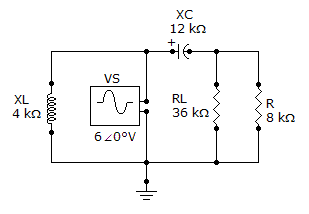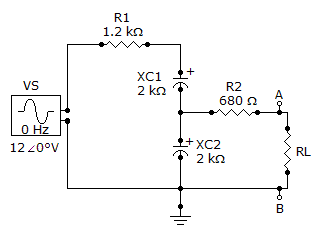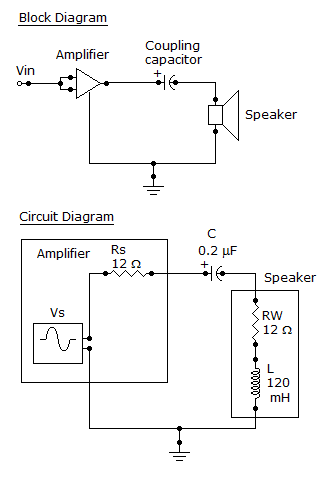Discussion
Home ‣ Electrical Engineering ‣ Circuit Theorems in AC Analysis Comments
- Question
In order to get maximum power transfer from a capacitive source, the load must
Options- A. have a capacitive reactance equal to circuit resistance
- B. have an impedance that is the complex conjugate of the source impedance
- C. be as capacitive as it is inductive
- D. none of the above
- Correct Answer
- have an impedance that is the complex conjugate of the source impedance
- 1. Referring to the given circuit, find ZTH if R is 15 kΩ and RL is 38 kΩ.

Options- A. 89.82 ∠?51.3° kΩ
- B. 19.2 ∠?38.3° kΩ
- C. 9.38∠?51.3° kΩ
- D. 180 ∠?38.3° kΩ Discuss
- 2. If two currents are in the same direction at any instant of time in a given branch of a circuit, the net current at that instant
Options- A. is zero
- B. is the sum of the two currents
- C. is the difference between the two currents
- D. cannot be determined Discuss
- 3. Norton's theorem gives
Options- A. an equivalent current source in parallel with an equivalent impedance
- B. an equivalent current source in series with an equivalent impedance
- C. an equivalent voltage source in parallel with an equivalent impedance
- D. an equivalent voltage source in series with an equivalent impedance Discuss
- 4. Determine VTH if R1 is changed to 3.3 kΩ.

Options- A. 0.574∠16.7° V
- B. 4.63∠16.7° V
- C. 4.63∠39.5° V
- D. 0.463∠39.5° V Discuss
- 5. Determine the frequency at which the maximum power is transferred from the amplifier to the speaker in the given figure.

Options- A. 1,027 Hz
- B. 10,270 Hz
- C. 6,330 Hz
- D. 63,330 Hz Discuss
- 6. For the circuit shown, determine ZTH for the portion of the circuit external to RL.

Options- A. 66.7 ∠?33.7° kΩ
- B. 6.67∠?333.7° kΩ
- C. 14.4 ∠?56.3° kΩ
- D. 1.44 ∠?33.7° kΩ Discuss
- 7. If in a Y-connected ac generator, each phase voltage has a magnitude of 90 VRMS, what is the magnitude of each line voltage?
Options- A. 0 V
- B. 90 V
- C. 156 V
- D. 180 V Discuss
- 8. A three-phase △-connected generator is driving a balanced load such that each phase current is 12 A in magnitude. When I ?a = 12 ∠30° A, what are the polar expressions for the other phase currents?
Options- A. I ?b = 12 ∠150° A, I ?c = 12∠?90° A
- B. I ?b = 12∠120° A, I ?c = 12∠30° A
- C. I ?b = 12∠30° A, I ?c = 12∠120° A
- D. I ?b = 12∠90° A, I ?c = 12∠90° A Discuss
- 9. In a △-connected generator, all of the phase voltages are
Options- A. zero
- B. equal in magnitude
- C. one-third of total
- D. one-sixth of total Discuss
- 10. In a certain three-wire Y-connected generator, the phase voltages are 2 kV. The magnitudes of the line voltages are
Options- A. 2,000 V
- B. 6,000 V
- C. 666 V
- D. 3,464 V Discuss
Circuit Theorems in AC Analysis problems
Search Results
Correct Answer: 9.38∠?51.3° kΩ
Correct Answer: is the sum of the two currents
Correct Answer: an equivalent current source in parallel with an equivalent impedance
Correct Answer: 4.63∠39.5° V
Correct Answer: 1,027 Hz
Correct Answer: 6.67∠?333.7° kΩ
Correct Answer: 156 V
Correct Answer: I ?b = 12 ∠150° A, I ?c = 12∠?90° A
Correct Answer: equal in magnitude
Correct Answer: 3,464 V
Comments
There are no comments.More in Electrical Engineering:
Programming
Copyright ©CuriousTab. All rights reserved.
